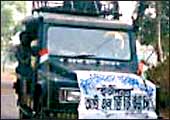 |
| A widening chasm: Villagers have dug
up most roads leading to Nandigram to keep out the police
and CPI(M) members |
JANUARY
15, 2007
9.00 A.M., Nandigram (Purba Medinipur), 165 km from Kolkata
The
place resembles a war zone. Most roads leading up to Nandigram
have been dug up; the craters are 2-3 feet deep and several feet
across. Where they still exist, local villagers have erected makeshift
brick walls, blocking passage. And citizen's committee members
patrol the area round the clock, stopping strangers (my colleague
from BT Photo and I were stopped at more than a dozen places)
and generally keeping vigil against "biased news reporters,
government officials and CPI(M) members". It's hard to believe
that I'm in West Bengal, but the Party (a synonym for the ruling
party) is clearly on the run in this neck of the woods.
 |
| Revving up: Trinamool lends a hand |
We reached Nandigram after a four-hour drive from Kolkata. From
here, it was a 30-minute walk to Abu Tahir's bicycle shop in Chowringhee
Bazar. Tahir, a leader of the Bhoomi Bachao Committee, is our
local contact; the meeting has been arranged by a senior political
leader in Kolkata. "Why do you want to go into the interiors?"
he asks. We explain our mission, but he is dismissive. "What's
the point? You'll go back and write that there are only jungles
here... might as well go back and write that anyway," he
says, somewhat menacingly, as another member of the committee,
Seikh Sufian, walks in and joins the discussion. We press our
point and finally convince them to give us a guide. A fairly large
crowd has gathered around us by now. "Who are these people,
Tahir Bhai?" they want to know. "Are they government
agents?" Tahir replies in the negative and introduces us.
"Don't worry," he says, "they're not Buddha Babu's
agents; they work for a Delhi-based publication."
11.00 a.m.-3.00 p.m.: We've been riding on the carriers of two
bicycles for the last hour. Our guides, arranged by Sufian and
Tahir, take us through lush countryside dotted with medium-size
hamlets-we've passed by more than half a dozen of them in the
time we've spent hitching a lift. "About 80,000-85,000 people
live in 38 villages across the 37 sub-divisions that the government
wants to acquire," says one of our guides. Around us, we
see crops of lentil, betel leaves, peas and paddy, giving lie
to the government's claim that it is acquiring mostly non-arable
lands. Prawn farming is also big in this area.
 |
 |
| Bridge to nowhere: The concrete
bridge (left) has been torn down to cut off the area from
Haldia; (R) a prawn farmer |
Our route takes us to a four-point crossing where a concrete
bridge has been torn down to cut the area off from Haldia, a CPI(M)
stronghold, 15 km away. A group of villagers is standing guard
here. The leader, who, we later learn, is called Abdullah, flags
us down. He's obviously well known to our guides who introduce
us.
"Arms and bombs are being smuggled in from Haldia using
that route," he alleges, pointing to the Haldi river in the
distance, "but we're prepared." What does he mean by
'prepared'? He signals us to sit on a charpoy under a shady tree
and explains: "Every Muslim family has a loud-hailer and
Hindu family a conch shell. They have been instructed to play
Azaan (the call for prayer) tunes on their loud-hailers or blow
their conch shells at the first hint of trouble; that will alert
our self-defence committees and give us notice of an impending
attack." He adds that though the villagers are armed only
with sticks and sickles, they are prepared to take on their (allegedly)
better-armed opponents if the need arises.
 |
| Final stroke: The writing’s on
the wall |
 |
| Sinister moves: Arms are allegedly being
smuggled in on country boats |
And why isn't the government fixing the roads and the bridges
that have been damaged? "We will not allow these to be repaired.
They will only become conduits for the Party and the police to
come and attack us," Abdullah adds. "We've been hardcore
CPI(M) workers all our lives," says a member of his group,
"and know how the Party operates like the back of our hands."
3.00-6.00 p.m.: Our backs are breaking from being ferried around
on cycles all day but we labour on. En route is a village called
Jellingham. "The government acquired close to 1,000 acres
of land here 18 years ago. The Party promised us compensation
and jobs in the factory that Burn Standard was supposed to put
up on it. No money has yet been paid and, obviously, no jobs created
(the plan for the factory has since been scrapped). So, how can
we trust the government this time around?" Abdullah asks.
The clock is ticking away. "You people had better head
home. This place is not at all safe after sunset," he says.
I tell him that I want to meet some CPI(M) leaders to get their
point of view. "Most of us have been CPI(M) workers for 30-35
years, but are now opposing the party's decision to take away
our land," he says. And those leaders who remain with the
party have fled this area. I blink away my disbelief.
West Bengal Chief Minister Buddhadeb Bhattacharjee has since
called off all land acquisition proceedings till he comes out
with an equitable and acceptable policy on the issue. Nandigram,
meanwhile, continues to sit on the edge of a precipice.
|










